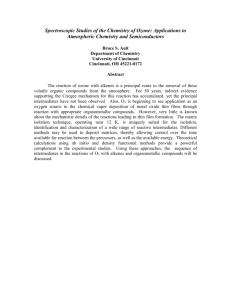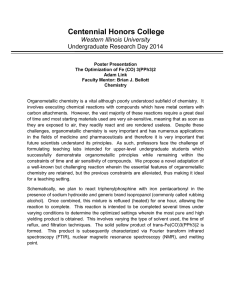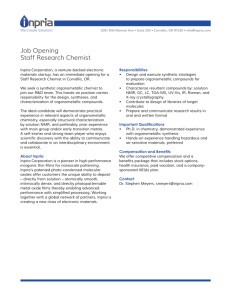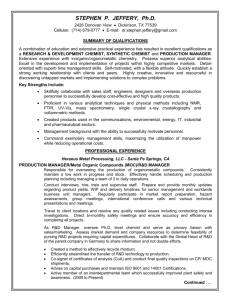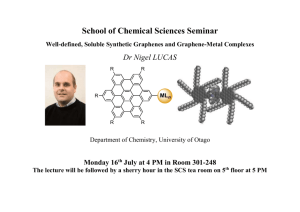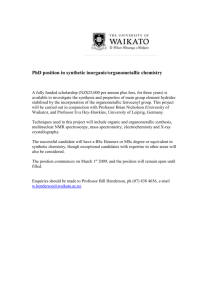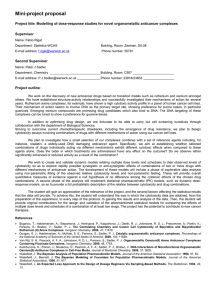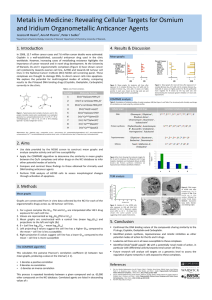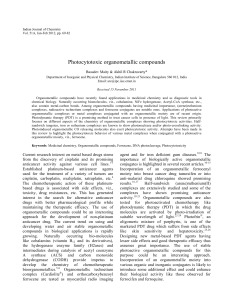CHEM 4011 ADVANCED INORGANIC CHEMISTRY II Spring 2013
advertisement
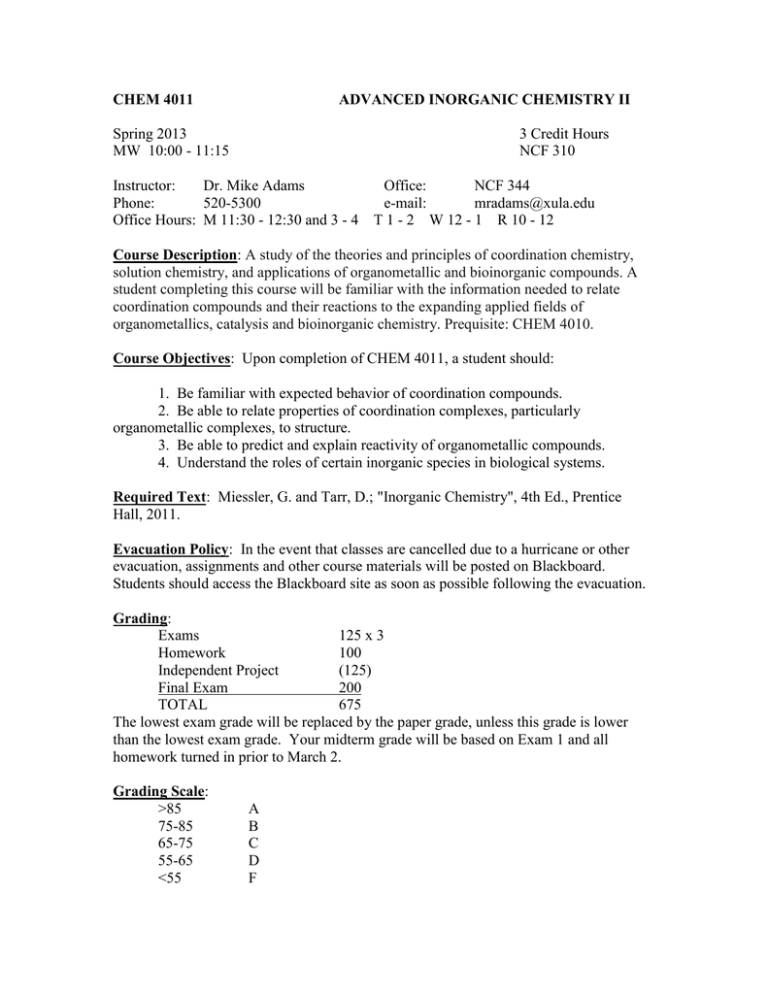
CHEM 4011 ADVANCED INORGANIC CHEMISTRY II Spring 2013 MW 10:00 - 11:15 3 Credit Hours NCF 310 Instructor: Dr. Mike Adams Phone: 520-5300 Office Hours: M 11:30 - 12:30 and 3 - 4 Office: NCF 344 e-mail: mradams@xula.edu T 1 - 2 W 12 - 1 R 10 - 12 Course Description: A study of the theories and principles of coordination chemistry, solution chemistry, and applications of organometallic and bioinorganic compounds. A student completing this course will be familiar with the information needed to relate coordination compounds and their reactions to the expanding applied fields of organometallics, catalysis and bioinorganic chemistry. Prequisite: CHEM 4010. Course Objectives: Upon completion of CHEM 4011, a student should: 1. Be familiar with expected behavior of coordination compounds. 2. Be able to relate properties of coordination complexes, particularly organometallic complexes, to structure. 3. Be able to predict and explain reactivity of organometallic compounds. 4. Understand the roles of certain inorganic species in biological systems. Required Text: Miessler, G. and Tarr, D.; "Inorganic Chemistry", 4th Ed., Prentice Hall, 2011. Evacuation Policy: In the event that classes are cancelled due to a hurricane or other evacuation, assignments and other course materials will be posted on Blackboard. Students should access the Blackboard site as soon as possible following the evacuation. Grading: Exams 125 x 3 Homework 100 Independent Project (125) Final Exam 200 TOTAL 675 The lowest exam grade will be replaced by the paper grade, unless this grade is lower than the lowest exam grade. Your midterm grade will be based on Exam 1 and all homework turned in prior to March 2. Grading Scale: >85 75-85 65-75 55-65 <55 A B C D F Tentative Exam Dates: EXAM 1 EXAM 2 EXAM 3 FINAL EXAM Tuesday, Feb. 19, 6:00 pm Tuesday, Mar. 12, 6:00 pm Wednesday, Apr. 17, 6:00 pm Saturday, May 4, 10:30 am Students will not be allowed to make-up missed exams. In the event that a student misses an exam, this will count as the dropped grade for the semester and will be replaced by the paper grade. Attendance: Students are expected to attend all lectures and participate in class discussions. It is expected that you will have completed the assigned reading for the day prior to lecture. Academic Misconduct: Academic misconduct includes, but is not limited to: 1. using unauthorized materials in completion of an exam, quiz, or assignment; 2. assisting or gaining assistance from an unauthorized source during an exam, quiz, or assignment; 3. providing assistance to another student in a manner not authorized by the instructor; 4. obtaining an examination or assignment in an unauthorized manner; 5. using material from a source without giving proper citation; 6. improperly fabricating or altering data; 7. submitting work to one class that is substantially similar to work submitted for another class without prior approval from the instructors involved; 8. submitting written work that is not completely one's own or allowing others to submit one's work; 9. destroying or altering the work of another student; or 10. committing any other violation of academic integrity as described in course syllabi. Disciplinary sanctions for academic misconduct include academic censure, academic suspension, dismissal, or expulsion from the University. The full text of the College of Arts and Sciences' Academic integrity Policy can be found at www.xula.edu/cas. Any form of academic misconduct will not be tolerated. Your written work, INCLUDING HOMEWORK, must be your own, and any sources you may use must be properly cited. Any violation of this policy will carry a minimum penalty of a grade of zero for the assignment, but a failing grade for the course may be assigned as the penalty. Project Guidelines: To be discussed in class Homework Assignments: Due dates for homework will be announced in class. You will be allowed to work with a study partner on SOME of the homework problems. You and your partner(s) should turn in ONE copy of the problems in bold. Each of you must work alone on and separately turn in the other problems. ANY EVIDENCE OF COLLABORATION ON THE INDIVIDUAL PROBLEMS WILL BE PENALIZED SWIFTLY AND SEVERELY. THE MINIMUM PENALTY WILL BE THE LOWERING OF YOUR COURSE GRADE BY ONE FULL LETTER GRADE. An asterisk * indicates a bonus problem. You will not be penalized for incorrect solutions to bonus problems, but you will earn extra points for correct or partially correct answers. Homework solutions and will be posted on Blackboard following the due date. NO LATE HOMEWORK WILL BE ACCEPTED. Review Homework: Distributed in Lecture on January 15 Assignments for later chapters will be posted on Blackboard. TENTATIVE COURSE OUTLINE AND READING ASSIGNMENTS: DATE: LECTURE TOPIC READING January 15 Introduction, Review January 17 January 22 January 23 January 28 January 30 February 4 February 6 February 18 February 20 February 25 February 27 March 4 Introduction to Electronic Spectra; States and Term Symbols Electronic Spectra; TanabeSugano Diagrams More on Tanabe-Sugano Diagrams and Spectra; Charge-Transfer Spectra Catch-up and Review 11.1 - 11.2 Review of Mechanisms; Intro. to Substitution Reactions of Coordination Complexes More on Mechanisms of Substitution Reactions Reactions of Square Planar Complexes; Reactions of Coordinated Ligands Intro to Mechanisms of Redox Reactions 12.1 - 12.3 More on Redox Reactions, Catch-up Intro to Organometallic Chemistry; Nomenclature Review Carbonyl Complexes and Related Complexes Pi complexes March 6 Other Organometallic Complexes March 11 March 13 Catch-up and Review Survey of Organometallic Reactions March 18 More on Organometallic Reactions 11.3 11.3 12.4 12.5 - 12.7, 12.9 12.8 13.1 - 13.3 13.4 13.5 13.6 - 13.7 14.1 14.2 TENTATIVE COURSE OUTLINE AND READING ASSIGNMENTS: DATE: LECTURE TOPIC READING March 20 Catalysis 14.3 April 1 More on Catalysts 14.4 April 3 15.1 -15.3 April 15 Isolobal Analogy; MetalMetal Bonding Introduction to Cluster Compounds: Boranes More on Boranes; Heteroand Metallaboranes Metal Cluster Compounds April 17 Catch-up and Review April 22 Introduction to Bioinorganic Chemistry; Porphyrins Metalloenzymes 16.1 - 16.2 Applications of Inorganic Compounds in Medicine 16.6 April 8 April 10 April 24 April 29 15.4.1 15.4.2 - 15.4.6 16.3 - 16.4
